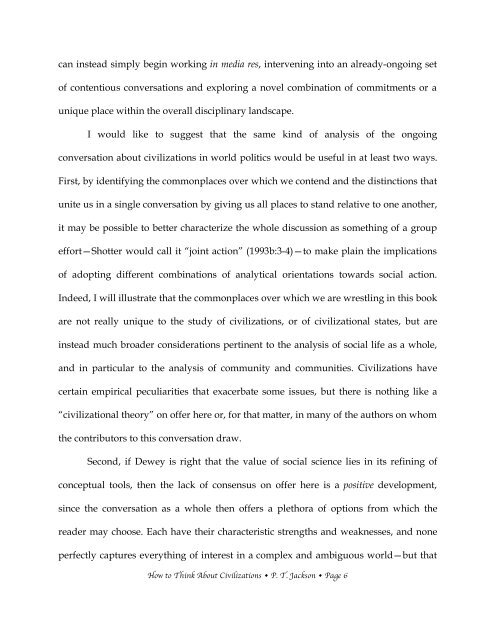How to Think About Civilizations - The Watson Institute for ...
How to Think About Civilizations - The Watson Institute for ...
How to Think About Civilizations - The Watson Institute for ...
You also want an ePaper? Increase the reach of your titles
YUMPU automatically turns print PDFs into web optimized ePapers that Google loves.
can instead simply begin working in media res, intervening in<strong>to</strong> an already-ongoing set<br />
of contentious conversations and exploring a novel combination of commitments or a<br />
unique place within the overall disciplinary landscape.<br />
I would like <strong>to</strong> suggest that the same kind of analysis of the ongoing<br />
conversation about civilizations in world politics would be useful in at least two ways.<br />
First, by identifying the commonplaces over which we contend and the distinctions that<br />
unite us in a single conversation by giving us all places <strong>to</strong> stand relative <strong>to</strong> one another,<br />
it may be possible <strong>to</strong> better characterize the whole discussion as something of a group<br />
ef<strong>for</strong>t—Shotter would call it “joint action” (1993b:3-4)—<strong>to</strong> make plain the implications<br />
of adopting different combinations of analytical orientations <strong>to</strong>wards social action.<br />
Indeed, I will illustrate that the commonplaces over which we are wrestling in this book<br />
are not really unique <strong>to</strong> the study of civilizations, or of civilizational states, but are<br />
instead much broader considerations pertinent <strong>to</strong> the analysis of social life as a whole,<br />
and in particular <strong>to</strong> the analysis of community and communities. <strong>Civilizations</strong> have<br />
certain empirical peculiarities that exacerbate some issues, but there is nothing like a<br />
“civilizational theory” on offer here or, <strong>for</strong> that matter, in many of the authors on whom<br />
the contribu<strong>to</strong>rs <strong>to</strong> this conversation draw.<br />
Second, if Dewey is right that the value of social science lies in its refining of<br />
conceptual <strong>to</strong>ols, then the lack of consensus on offer here is a positive development,<br />
since the conversation as a whole then offers a plethora of options from which the<br />
reader may choose. Each have their characteristic strengths and weaknesses, and none<br />
perfectly captures everything of interest in a complex and ambiguous world—but that<br />
<strong>How</strong> <strong>to</strong> <strong>Think</strong> <strong>About</strong> <strong>Civilizations</strong> • P. T. Jackson • Page 6
















